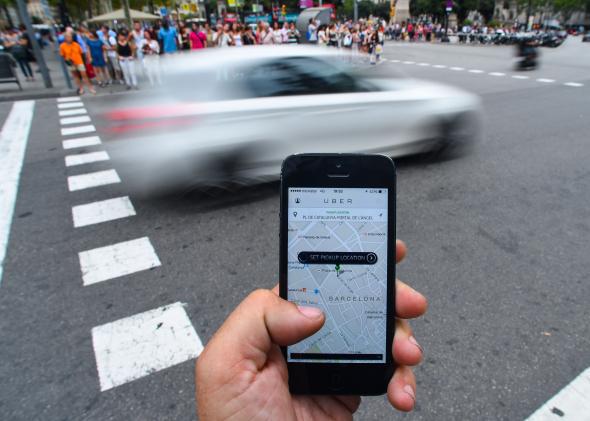Just as Uber passengers rate their drivers, Uber’s drivers rate their passengers. This fact has been public for a while now—the company published a blog post explaining the policy back in April, titled “Feedback Is a Two-Way Street.” But plenty of customers aren’t aware that they are graded, in part because Uber’s app doesn’t show riders their score (which is on a one-to-five-star scale). To find out, you need to ask a driver or contact customer support.
For a short while last night, however, the digital curtain was torn away and Uber fans were given an easy way to see where they stacked up, thanks to a clever hack published by Aaron Landy on Medium. The trick blew up on Twitter, pockets of which began to seem like a high school hallway where everybody was comparing AP scores. Eventually, though, the company appeared to sweep in and disabled the hack.
Uber says it is “exploring” ways to make rider ratings public on the next version of its app. But up until now, the company’s squirreliness about the ratings seems bizarre. Keeping rider ratings semi-secret seems counterproductive if the goal is to promote good backseat manners—customers who have a low rating and don’t know it won’t have the chance to mend their ways. Plus, allowing drivers to rate their passengers is just a fundamentally decent idea: Between road accidents and robberies, cabbies work in one of America’s most dangerous occupations, confronting all manner of weird, rude, and patently unhygienic behavior from riders day in and day out. Giving Uber drivers the option of avoiding fares with a history of aggressiveness or tactlessness might make the job a bit more humane. As one of my D.C.-based colleagues put it, “If I were a cabbie on U Street, and the person hailing me at 2 a.m. was someone with a history of puking in cabs, I would want to know.”
Unlike drivers, though, who can be booted from Uber’s network if their score falls below a 4.5, it’s unclear that poorly reviewed riders suffer much in the way of consequences for their lack of etiquette. Here’s how New York’s Kevin Roose described it:
One Uber driver told me that although Uber doesn’t normally take action against users with low ratings (though drivers can punish them simply by refusing to pick them up), a driver who rates a passenger lower than a 3 out of 5 stars will effectively trigger a “block” function that keeps that rider from appearing on the driver’s app in the future. Drivers who are harassed, attacked, or otherwise harmed by riders can file complaints and, in extreme cases, get the offenders removed from Uber’s system. But triggering real consequences requires drivers to take a stand—and few do.
Of course, this doesn’t explain or excuse Uber’s lack of transparency when it comes to ratings. Perhaps the company is worried that customers will drop the app once they find out they’ve been stuck with a three-star rating, possibly for arbitrary reasons. (Cabbies can be jerks, too.) If that’s the case, though, Uber should reconsider the ratings in the first place. If a customer isn’t likely to get top-notch service from a company because of a number floating in the digital ether, he should know about it. Uber already occupies a space somewhere between a private business and public utility in the cities where it’s most successful. The larger it gets, and the more people come to rely on it, the more pressing these transparency issues become.
Which brings us to a particularly touchy issue: the potential for discrimination. Uber has fought hard to prove that its drivers don’t avoid pickups in low-income or minority neighborhoods. But if poor or black and Hispanic riders did—for whatever reason—receive systematically lower scores, and received worse service as a result, it would be a problem for the company and for any city that came to depend on Uber as part of its transportation infrastructure. I don’t know if there’s a foolproof way to insure against that possibility. And it ultimately may be a reason to worry about Uber displacing traditional cabs. But keeping ratings out in the open seems like a logical first step. At the very least, if riders began to suspect something was amiss, they could bring it to the attention of regulators.
Sunshine seems like the best policy here. And in case anybody is wondering if I’m writing this article out of a sense of personal grievance, let it be known that my Uber rating is a perfect 5.
